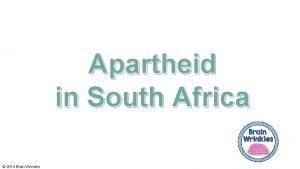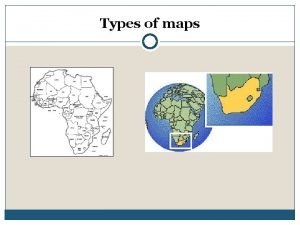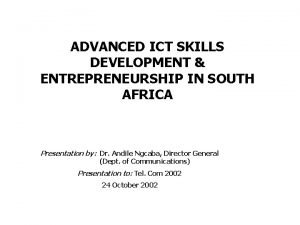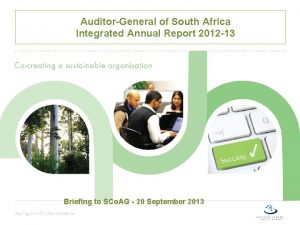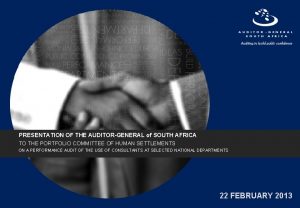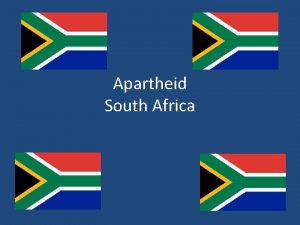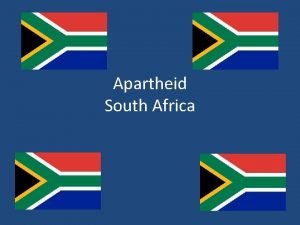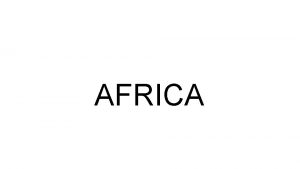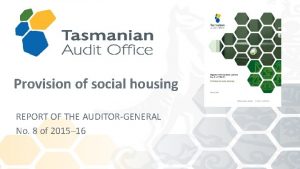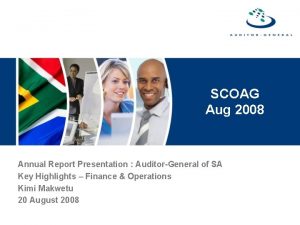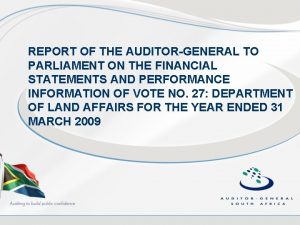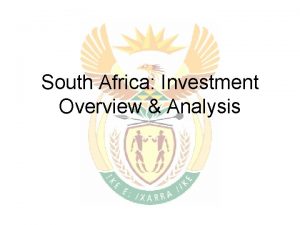Report of the AuditorGeneral of South Africa on













- Slides: 13

Report of the Auditor-General of South Africa on an investigation at the Commission for Gender Equality (CGE) 24 November 2010 Page 1

Introduction • In a letter dated 5 March 2009, the former Deputy Speaker of Parliament requested a joint investigation between the AGSA and the Public Protector (PP) based on a complaint and allegations of improper conduct at the CGE. • The AGSA and the PP considered the allegations with due regards to their respective mandates and consensus was reached that a joint investigation will not be conducted but that two separate investigations will be conducted on distinct issues raised in the allegations. • During the respective investigations, the AGSA and PP closely collaborated and assisted each other where it was appropriate. 2

Scope of investigation • Deviations from laws and regulations • Irregularities in the call account of the CGE • Irregularities with travelling and claims of commissioners and the former chairperson • Irregularities with financial lease contracts • Fraudulent activities in the CGE payroll system • Unjustified refunds and/or back pay to CGE employees The investigation covered the 2007/08 and 2008/09 financial years. 3

Findings • The findings that were identified are predominately due to the non-adherence to the CGE’S internal policies and procedures and the non-adherence with laws and regulations. • These findings also point to inadequate planning, monitoring and oversight by the leadership of the CGE to ensure performance, compliance and ethical behaviour. • The findings in this report are indicative of an environment at the CGE at the time, which presented a high risk and susceptibility to fraud. 4

1. Bank and cash management Various irregularities in the bank and cash management system of the CGE were noted due to the non-adherence with the Public Finance Management Act, the Treasury Regulations and the CGE’s internal policies and procedures. These findings include the following: • • • The CGE opened 11 bank accounts which included a call account, without approval of the NT and following the prescribed tender procedures. Bank overdrafts were noted in all 10 cheque accounts. Transfers made amounting to approximately R 250 000 could not be verified. No formal set of delegations were implemented for the approval of payments which resulted in cheques amounting to R 7. 6 million being processed on the bank statements without the approval of the accounting officer or any other delegated official. Payments above R 2 000 totaling R 58. 6 million were made per cheque and not electronically as prescribed. Various discrepancies were noted between the original cheques processed on the bank statements, the cheque stubs and information stated in the cheque register. 5

2. Corporate credit accounts The CGE did not comply with the requirements that were set by the circular of the Department of State Expenditure (now National Treasury) and the resolution taken by the plenary of the CGE with regard to the opening and managing of the corporate credit cards. As a result, the CGE corporate credit cards were utilised improperly. 6

3. Expenditure management Various irregularities in the expenditure management system of the CGE were noted due to the non-adherence with the Public Finance Management Act, the Treasury Regulations and the CGE’s internal policies and procedures. The findings relating to the expenditure management system are indicative of an environment that functioned without a formal set of delegations and the necessary organisational structure to ensure compliance and to prevent irregularities. These findings include the following: • • • Payments amounting to approximately R 58 million were identified which were not approved and/or recommended by a delegated official. A lack in internal controls were noted as payments were made to service providers without original invoices and/or supporting documentation and without any official certifying that the goods and/or services were delivered satisfactorily. Invoices and/or contractual obligations to services providers were not settled within the prescribed time which resulted in service providers issuing letters of demand. 7

4. Supply chain management The findings relating to supply chain management are predominantly due to non -adherence to Public Finance Management Act, the Treasury Regulations, the CGE’s internal policies and procedures and the Practice Notes issued by the National Treasury. These findings are further amplified by the fact that no supply chain management unit and formal bid committees were established to ensure that the supply chain management system is fair, equitable, transparent, competitive and cost-effective. These findings include the following: • No approved SCM policy and the draft policy was not in line with all aspects of SCM prescripts • No list of prospective suppliers was compiled and quotations were requested without consulting any list of approved or prospective suppliers. • The prescribed procurement processes were not always followed in the procurement of goods and/or services which resulted in irregular expenditure of approximately R 19. 1 million. • A lack of communication and monitoring of contracts with service providers resulted in contract periods and amounts being exceeded which had an financial implication for the CGE of approximately R 5. 5 million. • Various cases were identified where the CGE made payments to service provider on contracts which were invalid or without entering into contracts. 8

5. Claims and allowances • Various instances were identified where the Public Finance Management Act, the Treasury Regulations, the CGE’s internal policies and procedures relating to subsistence, travel and cellular phone claims were contravened by the commissioners, the deputy chairperson and former chairperson which resulted in possible irregular payments amounting to approximately R 2. 9 million. • Due to a lack in cellular phone policy, the former chairperson incurred cellular phone expenditure amounting to approximately R 46 401 in March 2009 for which the CGE had not been reimbursed by July 2010. 9

6. Air travel, accommodation and car hire • • Various instances were identified where the Public Finance Management Act, the Treasury Regulations, the CGE’s internal policies and procedures relating to air travel, accommodation and car hire were contravened by the commissioners, the deputy chairperson and former chairperson which resulted in possible irregular payments amounting to approximately R 5 million. Various irregularities were identified relating to travel arrangements for the former chairperson, which included the following: • Travel arrangements were made for the former chairperson’s relatives for which the CGE subsequently paid. The CGE has not been reimbursed for these trips amounting to R 34 000 by July 2010. • The CGE paid R 25 000 to the former chairperson to upgrade her air ticket when she travelled to Geneva. It was however noted that the costs for the upgrade amounted to R 23 279 and that the CGE had not been reimbursed for the difference of R 1 721. • The CGE paid an amount of R 220 414 for a trip which the former chairperson had indicated that she secured funds from a sponsor. No confirmation could be provided by July 2010 that the sponsor or former chairperson reimbursed the CGE for the trip. 10

7. Human resources A lack in an overtime policy in the CGE resulted in excessive overtime payments amounting to approximately R 622 881 (over a period of 24 months) and employees claiming overtime in excess of the prescribed hours in terms of the Basic Conditions of Employment Amendment Act. 11

Response by the relevant role-players • The management report was issued to the CGE management for comments and/or inputs in April 2010 and to the plenary in May 2010. The former chairperson was also provided with an opportunity to respond on the specific findings that related to her. • A final response was received from the CGE management, the plenary and the former chairperson during June 2010. • The CGE management indicated in their response that they noted all the recommendations that were made in the report and that they intend to implement the relevant corrective measures to address the deficiencies that were identified by including these recommendations into the CGE’s turnaround plan to be implemented during the 2010/11 financial year. 12

Reputation promise/mission The Auditor-General of South Africa (AGSA) has a constitutional mandate and, as the Supreme Audit Institution (SAI) of South Africa, it exists to strengthen our country’s democracy by enabling oversight, accountability and governance in the public sector through auditing, thereby building public confidence. 13
 Honeywell s8610u flame rod shorted
Honeywell s8610u flame rod shorted Did the dutch colonize south africa
Did the dutch colonize south africa Types of maps in tourism
Types of maps in tourism Causes of unemployment in south africa
Causes of unemployment in south africa Eeo australia
Eeo australia Exhibition stand pretoria
Exhibition stand pretoria Universal animal stak review
Universal animal stak review Safbc
Safbc Examine the history of community development
Examine the history of community development South africa 1860
South africa 1860 11 official languages of south africa
11 official languages of south africa Apartheid
Apartheid Physical features of south africa grade 5
Physical features of south africa grade 5 Edunet south africa
Edunet south africa

